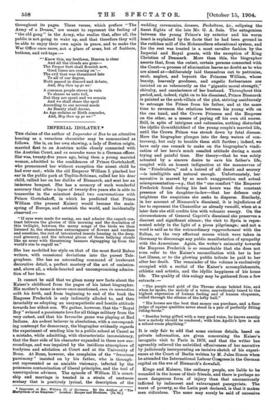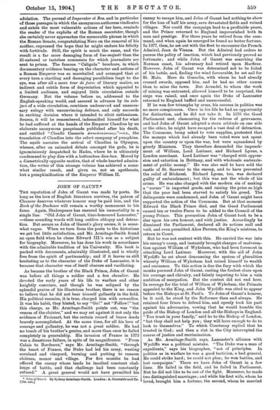hearing as a veracious chronicler may be summarised as follows.
She is, on her own showing, a lady of Breton origin, married first to an Austrian noble closely connected with the Austrian Court, and en secondes noces to a German officer. She was, twenty-five years ago, being then a young married woman, admitted to the confidences of Prince Gortchakoff, who pronounced her without exception the nicest child he had ever met ; while the old Emperor William I. pinched her ear in the public park at Teplitz-Schonau, called her his dear child, rallied her on her dislike of Bismarck, and sent her an iminense bouquet. She has a memory of such wonderful accuracy that after a lapse of twenty-five years she is able to transcribe in the minutest detail two conversations with Prince Gortchakoff, in which he predicted that Prince William (the present Kaiser) would become the main- spring of Europe, and astonish the world, and incidentally
" If eyes were made for seeing, see and admire the superb con- trast between the glories of this morning and the desolation of this twilight, between the merry songs of the birds we then listened to, the shameless extravagance of flowers and verdure and sunshine, the riot of intoxicated insects buzzing in the deep, cool greenery, and the infernal gloom of those bellying clouds like an army with threatening banners zigzagging up from the world's rim to engulf us."
She has modelled her style on that of the most florid Baboo writers, with occasional deviations into the purest Tele- graphese. She has an astounding command of irrelevant
decorative detail, a perfect mastery of the art of omission, and, above all, a whole-hearted and uncompromising admira- tion of her hero.
It cannot be said that we glean many new facts about the Kaiser's childhood from the pages of his latest biographer. His mother's name is never once mentioned, even in connection with his birth, and from beginning to end of the book the Empress Frederick is only indirectly alluded to, and then invariably as adopting an unsympathetic and hostile attitude towards her eldest son. We gather, however, that the "Royal Boy" evinced a passionate love for all things military from the very outset, and that his favourite game was playing at Red Indians. An ardent believer in absolutism, with a correspond- ing contempt for democracy, the biographer evidently regards the experiment of sending him to a public school at Cassel as a mistake, while admitting, with characteristic inconsistency, that the finer side of his character expanded in these new sur- roundings, and was impaired by the insidious atmosphere of toadyism and adulation at Court and at the University of Bonn. At Bonn, however, she complains of the "ferocious parsimony" insisted on by his father, who is through- out represented as an amiable visionary, infected by the poisonous contamination of liberal principles, and the tool of unscrupulous advisers. The episode of William IL's court- ship and marriage is treated in a strain of unctuous ecstasy that is positively lyrical, the description of the
• Imperator et Rex William II. of Germany. By the Author of "The Martyrdom of an Empress." London Harper and Brothers. [7s. ad.]
wedding ceremonies, dresses, Fackeltans, dr.c., eclipsing the finest flights of the late Mr. G. A. Sala. The antagonism between the young Prince's icy exterior and his warm heart is explained by the facts that he had been ground in the ruthless mill of the Hohenzollern educational system, and for the rest was treated in a most cavalier fashion by the Imperial and Royal guests, with the exception of King Christian of Denmark. More than this, the biographer asserts that, from the outset, certain persons connected with the Court--a process of elimination leaves no doubt as to who are aimed at—deliberately laid themselves out to patronise, snub, neglect, and boycott the Princess William, whose beauty, heavenly goodness, and angelic forbearance are insisted on as vehemently as the "gigantic moral strength," chivalry, and omniscience of her husband. Throughout this period, and, indeed, right on to his dismissal, Prince Bismarck is painted as the arch-villain of the plot, striving assiduously to estrange the Prince from his father, and at the same time to envenom the relations between his young wife on the one hand, and the Crown Princess and the Empress on the other, as a means of paying off his own old scores. Still, in spite of intrigues and calumnies, nothing disturbed the idyllic Gemicalichkeit of the young couple's married life, until the Crown Prince was struck down by fatal disease. Here the biographer plunges into the deep waters of con- troversy, but only to trouble them still further ; indeed, we have only one remark to make on the biographer's vindi- cation of her hero's much assailed attitude during a most trying and painful time. Her theory—that be was solely actuated by a sincere desire to save his father's life, coupled with an honest indignation at the naanceuvres of the " Friedrichers," and a hatred of all deceit and secrecy —is intelligible and natural enough. Unfortunately, her narrative is marred by so much exaggeration and actual misrepresentation—e.g., that the "one comfort" the Emperor Frederick found during his last hours was the constant presence of his daughter-in-law—that her defence only heightens the suspicions she seeks to disperse. Similarly, in her account of Bismarck's dismissal, it is injudicious of her to represent the Chancellor as already ramolli, when at a later date she still credits him with volcanic energy. On the circumstances of General Caprivi's dismissal she preserves a discreet and significant silence ; the visit to Syria is repre- sented solely in the light of a pious pilgrimage ; and not a word is said as to the extraordinary rapprochement with the Sultan, or the very effectual means which were taken in Germany to discourage any public manifestation of sympathy with the Armenians. Again, the writer's animosity towards the Empress Frederick is so remarkable that she does not even refer to the Kaiser's reconciliation with her in her last illness, or to the glowing public tribute he paid to her after her death. The remainder of the volume is exclusively occupied with a recital of the Kaiser's accomplishments, athletic and artistic, and the idyllic happiness of his home life. The quality of this eulogy may be gathered from a few extracts :—
" The purple and gold of the Throne shone behind him, and when he spoke, the melody of a voice, marvellously tuned to the highest expression of human feeling and of human eloquence, rolled through the silence of the lofty hall."
"His horses are the best that money can purchase, and a finer judge of equine qualities never stood in a pair of perfectly fitting riding-boots."
"Besides being gifted with a very good voice, he knows exactly how a melody should be rendered; with him Apollo's lyre is not a school-room plaything."
It is only fair to add that some curious details, based on private information, are given concerning the Kaiser's incognito visit to Paris in 1878, and that the writer has agreeably relieved the unbridled effusiveness of her narrative by judiciously incorporating an incisive sketch of his experi- ences at the Court of Berlin written by M. Jules Simon when he attended the International Labour Congress in the German capital on the eve of Bismarck's downfall.
Kings and Kaisers, like ordinary people, are liable to be wounded in the house of their friends, and there is perhaps no more dangerous form of injury than that unconsciously inflicted by indiscreet and extravagant panegyrists. The worst of poverty, so the Latin poet declared, is that it makes men ridiculous. The same may surely be said of excessive
adulation. The perusal of imperator et Rex, and in particular of those passages in which the anonymous authoress vindicates and extols the most vulnerable actions of her hero, reminds the reader of the exploits of the Roman assentator, though she certainlynever approaches the memorable phrase in which the Roman Senate, congratulating Nero on the removal of his mother, expressed the hope that he might endure his felicity with fortitude. Still, the spirit is much the same, and the result is a far more damaging form of lese-majestg than the ill-natured or tasteless comments for which journalists are sent to prison. The famous " Caligula " brochure, in which documentary evidence bearing on the character and actions of a Roman Emperor was so marshalled and arranged that at every turn a startling and damaging parallelism leapt to the eye, was after all a mere tour de force of literary malice, an indirect and subtle form of depreciation which appealed to a limited audience, and enjoyed little circulation outside Germany. But the volume before us, addressed to the English-speaking world, and assured in advance by its sub- ject of a wide circulation, combines undeserved and unneces- sary eulogy with unconvincing defence, and only succeeds in exciting derision where it intended to elicit enthusiasm. Seneca, it will be remembered, indemnified himself for what he had suffered at the hands of the Emperor Claudius by an elaborate anonymous pasquinade published after his death, and entitled " Claudii Caesaris cilreaomaiorralsic,"-1.e., the translation of Claudius into the select company of pumpkins. The squib narrates the arrival of Claudius in Olympus, whence, after an animated debate amongst the gods, he is ignominiously despatched to Hades, where he is ultimately condemned to play dice with a bottomless dice-box. Moved by a, diametrically opposite motive, that of whole-hearted admira- tion, the writer of this strange volume has achieved a some- what similar result, and given us, not an apotheosis, but a pumpkinification of the Emperor William IL











































 Previous page
Previous page